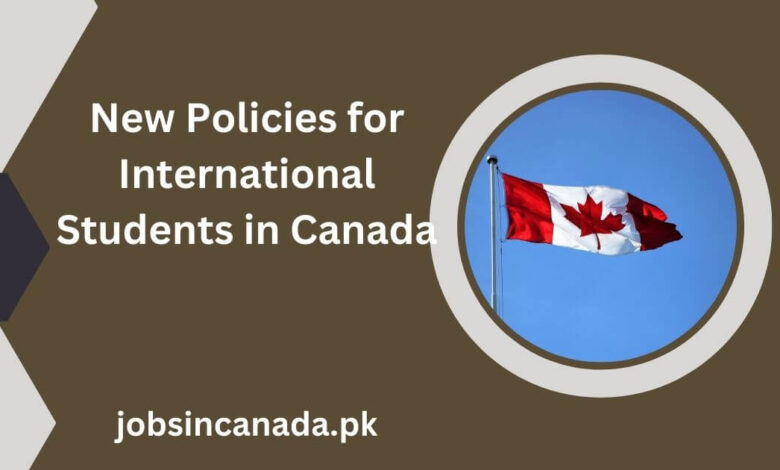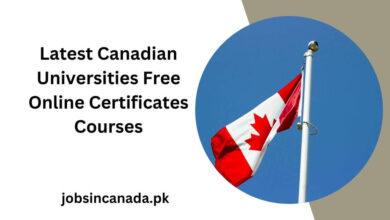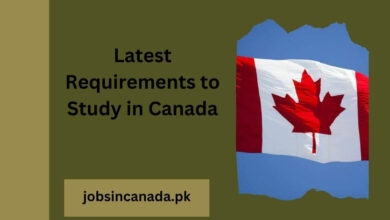New Policies for International Students in Canada 2025

The country of Canada has consistently been the preferred destination for international students to pursue their education. One of the remarkable reasons for this growing preference is the country’s international student-friendly norms and inclusivity, which are among the many top reasons.
The Canadian Government has recently announced revised requirements to better safeguard international students, to keep up with the latest announcements and measures of the country’s International Student Program, and to curb fraudulent practices.
Therefore, this news update is intended for those who intend to pursue their education in Canada. To gain a deeper understanding of the most recent modifications implemented by Immigration, Refugees, and Citizenship Canada (IRCC), please continue reading.
Overview
In a recent update, Immigration, Citizenship, and Refugees Canada (IRCC) has implemented significant modifications to the fundamental standards and procedures that apply to international students. The present cost-of-living criterion for a single application will be increased to CAN 20,635 in 2025, from CAN 10,000. This increase is applicable to study visa applicants. The purpose of this modification is to ensure that students arrive in Canada with sufficient funds to cover their living expenses.
Revised Cost of Living for Study Permit Applicants
In order to ensure that international students are financially prepared for life in Canada and can concentrate solely on their higher education, Mr. Marc Miller, Minister of Immigration, Refugees, and Citizenship, has announced a substantial reform in the financial requirements. The amount that was previously defined at CAD 10,000 in the early 2000s is being revised due to the significant increase in living expenses. Consequently, the cost-of-living threshold for study visa applicants has been adjusted to $20,635 as of 2025.
This new financial requirement threshold will be altered when Statistics Canada modifies the low-income cut-off (LICO). For the time being, international students will be able to maintain a comfortable standard of living in Canada with a living expenditure of $20,635, which accounts for 75% of LICO. Additionally, students are required to submit documentation regarding their initial year of tuition and travel expenses. All new study permit applications submitted on or after this date will be subject to this increased fee. Student Direct Stream (SDS) applicants will also be subject to this new financial criteria.
The Effect on Study Permit Applicants
The Student Direct Stream, a customized study visa application procedure that is available to citizens of specific countries, will be subject to the higher cost-of-living criteria. Applicants must demonstrate their financial capacity through a variety of methods, with the exception of tuition and travel expenses. Although this action is intended to align with the current cost of living, it may decrease the number of individuals who are eligible to apply for a study permit in Canada.
Check Also: Before Relocate To Canada All You Need To Know
Benefits of New Policies for International Students in Canada
- Longer Duration of PGWPs: Certain international pupils are now eligible for post-graduation work permits that are of a longer duration. This provides graduates with an additional opportunity to acquire work experience in Canada and enhance their likelihood of obtaining permanent residency.
- Additional Employment Opportunities: Some cases have expanded the capacity to work full-time during studies, particularly during scheduled vacations or in co-op programs, by providing financial assistance while studying.
- Express Entry Stream for International Graduates: Canada has simplified the process for international students to transition to permanent residency through the Express Entry program, enabling them to accumulate Canadian work experience and meet the eligibility criteria for immigration programs more easily.
- Provincial Nominee Programs (PNPs): Specific provinces have developed PNPs that are specifically designed to attract international graduates, providing them with additional incentives to remain and work in specific regions of Canada.
- Work While Studying: Policies have been modified to enable international students to work off-campus without the necessity of a separate work permit. This allows students to more effectively reconcile their academic pursuits with their income-generating activities.
- Easier Path for Spouses: Open work permits are now available to the spouses of international students, which will enable them to work full-time in Canada. This can be a significant advantage for families.
- Reintroduction of Online Study Options: International students were permitted to pursue their studies online during the COVID-19 pandemic without it affecting their eligibility for post-graduation work permits. In specific circumstances, this option has been expanded to provide international students with additional flexibility.
- Scholarships and Financial Aid
By providing financial aid, scholarships, and funding opportunities, certain new policies are designed to encourage international students and make the cost of studying in Canada more manageable. This has become a critical factor in the context of Canada’s continued status as a competitive destination for international education.
Off-Campus Work Authorization Policies for International Students
Additionally, IRCC has implemented numerous interim policies for international students. The regulation that allows qualifying students to work more than 20 hours off-campus has been extended until, 2025. This extension enables students to make a more substantial contribution to the Canadian workforce, thereby addressing labor shortages.
PGWP Time Extension
Additionally, the regulation that permits international students to maintain their Post-Graduate Work Permit (PGWP) while studying abroad has been extended until, 2025. This provision, which was initially implemented in response to travel restrictions associated with the pandemic, continues to assist students who may be required to travel outside of Canada for portions of their academic program.
Strengthening the Integrity of Canada’s International Student Program
The 18-month Permit Extension has concluded. Conversely, the policy that grants PGWP holders an 18-month extension of permission, enabling eligible foreign nationals to apply for an open work permit extension, will expire as scheduled. This development underscores the necessity for foreign nationals to investigate alternative options for residing and working in Canada after their PGWP expires.
Navigating the Difficult Landscape
These initiatives are a component of IRCC’s ongoing endeavors to navigate the intricate landscape of international student immigration. The objective is to achieve a balance between the necessity of addressing domestic labor market requirements and Canada’s appeal as a global education destination.
For the first time in a decade, the IRCC will reevaluate the post-graduation work permit.
IRCC intends to ensure that the cost-of-living level remains pertinent to economic realities by adjusting it in accordance with Statistics Canada’s low-income cut-off in the future. Furthermore, in 2025, targeted pilot programs will be implemented to aid international students in their pursuit of higher education in Canada.
Summary of the Updates on Three Temporary International Student Policies
In addition to the revised cost-of-living level, Minister Miller has also announced official revisions to three transitory policies that affect overseas students. The following revisions are necessary due to the fact that these policies are scheduled to expire at the end of.
Extended Waiver of the Weekly 20-Hour Limit
International students who have applied for a study permit and are currently in Canada will be exempt from the 20-hour-per-week limit for off-campus employment. This exemption has been extended until, 2025, enabling international students to labor for a minimum of 20 hours per week during their semesters.
Updated Distance Learning Facilitation Measure
The Distance Learning Facilitation Measure has been revised to enable students to consider their online study time when calculating their prospective post-graduation work permit. If you commence your academic program before September 1, 2025, you are eligible for this extension. It is important to note that this does not apply if your program commences on or after this date.
Further extensions of Post-Graduation Work Permits (PGWPs).
Three times, a provisional policy was announced to extend an additional 18-month work permit to a post-graduation work permit in recognition of the country’s labor market challenges during the pandemic and post-pandemic recovery. Individuals who possess a post-graduation employment visa that expires before December 31, 2023, will be eligible to apply. Nevertheless, this provisional policy will not be extended indefinitely.
Therefore, if you are an international student who aspires to pursue a degree in Canada, you must initiate the application process for the forthcoming academic year at the earliest opportunity. If these developments are causing you to have a plethora of concerns, it is now the appropriate time to seek professional assistance. KC’s Canada advisors are available to provide answers to all of your questions regarding the Canada study permit. In addition to providing comprehensive end-to-end support for your study abroad plans, our experts will also guide you through these enhancements.
Fraquality Asked Question:
-
What are the new laws in Canada 2025 for international students?
In 2025, Canada introduced a two-year cap on study permits, reducing the number by 35%. Dit means dat fewer international students will be allowed to enter Canada for their studies. By 2025, the number of study permits will be further reduced by 10%, with a maximum of 437,000 permits.
-
What is the new policy in Canada 2025?
In March 2025, Canada announced a plan to decrease the number of temporary residents to 5% of the total population over the next three years, including temporary foreign workers and international students.
-
What is the new update for international students in Canada?
With the new measures, eligible international students can now work up to 24 hours per week off-campus without a work permit while enrolled in full-time classes. Before this change, the limit was 20 hours per week.




